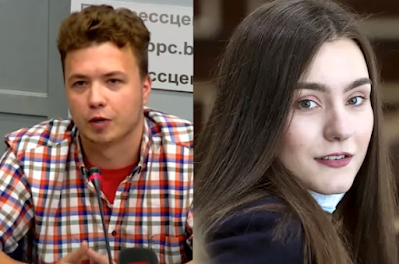Solidarity with our brothers and sisters in Belarus
May 21st is the day of the political prisoner in Belarus. This event was organized by Libereco, a partnership for Human Rights is a Swiss-German NGO that advocates for the respect and maintenance of human rights in Belarus and Ukraine.
Belarus must free Raman Pratasevich and Sofia Sapega. Stop the crackdown on freedom of expression.
— Amnesty International (@amnesty) May 28, 2021
Take action to demand their freedom now: https://t.co/uasdIzo2Z8 📢 pic.twitter.com/4kJDoL2pcX
This blog today is dedicated to Belarusian journalist Raman Pratasevich and his Russian girlfriend Sofia Sapega who today are political prisoners in Belarus.
Belarus, Europe's last dictatorship, its security services and a MiG-29 on May 23, 2021 diverted a commercial airline to kidnap a dissident journalist and his girlfriend. "Belarusian authorities scrambled a [Mig-29] fighter jet and flagged what turned out to be a false bomb alert to force a Ryanair plane to land on Sunday and then detained [Raman Pratasevich] an opposition-minded journalist, and [ his girlfriend Sofia Sapega ] who [were] on board, drawing condemnation from Europe and the United States," reported Reuters.
 |
| Political Prisoners: Raman Pratasevich and Sofia Sapega |
According to the U.S. Secretary of State Antony Blinken in a statement released on May 23, 2021, " initial reports suggesting the involvement of the Belarusian security services and the use of Belarusian military aircraft to escort the plane are deeply concerning and require full investigation."
CNN on May 25, 2021 reported on the gravity of what happened and also quoted the CEO of Ryanair:
The 26-year-old dissident was traveling on Ryanair flight 4978 from Athens, Greece to Vilnius, Lithuania on Sunday when shortly before touchdown the plane was diverted by Belarusian air traffic control to the capital Minsk over a supposed security alert.
Ryanair's CEO Michael O'Leary accused Belarus of "state-sponsored piracy," telling Ireland's Newstalk radio Monday that he believed Belarusian KGB agents were also on the flight that was carrying 26-year-old Protasevich, who is wanted in Belarus on a variety of charges.
A short while later a coerced confession was aired in violation of international standards.
The degrading and humiliating ‘interview’, showing Raman Pratasevich to be under intolerable psychological pressure, amounts to ill-treatment. Those behind this travesty must be held accountable.
— Amnesty International (@amnesty) June 9, 2021
You can still demand his freedom here 👇 pic.twitter.com/WdwCoCojYg
Nearly a year later on May 6, 2022 Sofia Sapega was sentenced to six years in a Belarusian prison. Raman Pratasevich was sentenced to eight years in prison earlier this month, nearly two years after a arbitrary detention that appeared to be more of an international kidnapping.
They should have never been arrested in the first place.


























